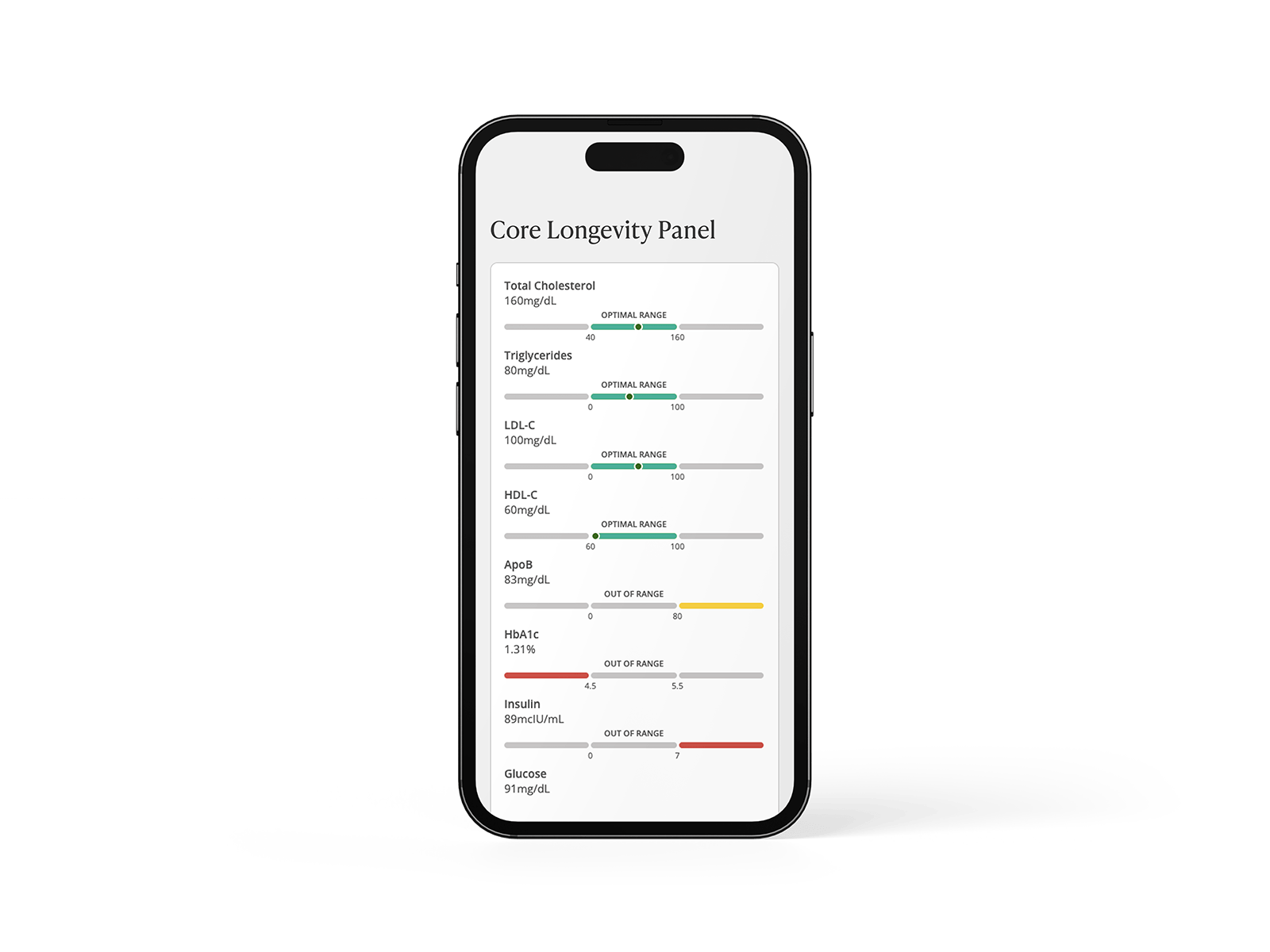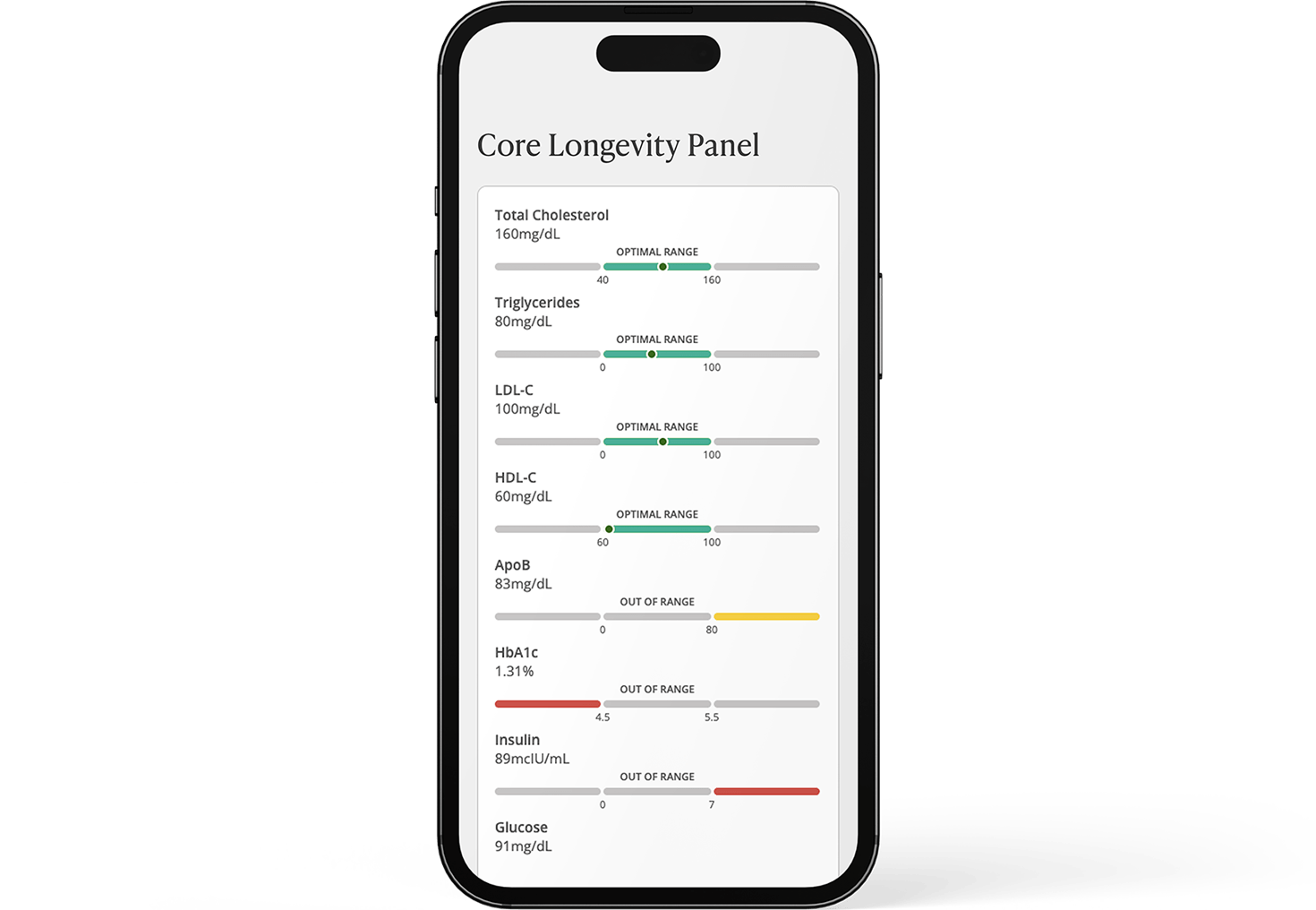Healthy you starts at the core

Heart health
Reveal your overall lipid profile and assess cardiovascular health to help detect risk for heart disease.

Inflammation
Measure inflammation in the body and assess risk for effects on immune health, heart health, and more.

Diabetes and insulin resistance
Detect your likelihood to have and develop diabetes and insulin resistance now or in the future.

Liver and kidney health
Evaluate key markers of liver and kidney function, such as Albumin and Globulin, to detect early signs of dysfunction and support overall metabolic health.
How it works
What good is all the progress made in longevity research if only a select few have access? Not good enough, if you ask us. Our simple and convenient lab-analyzed blood test is here to change that.


Order your test
We’ll generate a physician-ordered requisition for you to complete your labs.

Complete blood draw
Schedule your blood draw at a date/time convenient for you. The lab will take care of the rest.

Receive results
Review your digital results within 2 weeks to understand how you can optimize your health.
The future of health data is here
This test measures 40+ key biomarkers most likely to impact your longevity—including a few your primary care doctor may not routinely screen for. Results reveal core health status to accurately identify areas of improvement, as well as potential risks for leading causes of age-related damage and disease, such as heart disease, diabetes, and more.

ApoB
One of the strongest predictors of heart disease risk. A protein found on lipoprotein particles that is associated with lipids that can damage, clog arteries, and indicate cardiovascular disease.
LDL
Often called “bad” cholesterol, LDL carries essential cholesterol to cells via the blood. It is a key indicator of heart health, as higher levels can lead to damage of LDL which then go on to clog arteries and increase risk of heart problems.
HDL
Often called “good” cholesterol, HDL carries cholesterol to the liver to break it down and reduce unnecessary cholesterol from the body. Healthy levels are associated with reduced risk of heart disease.
Total Cholesterol
A waxy, fat-like substance found in every cell, this test measures the total amount of cholesterol molecules found in the blood to measure your heart health.
Triglycerides
A form of fat and a major source of energy for the body, this test measures the total amount of triglycerides in your blood to help identify risk of cardiovascular disease.
LP(a)
One of the most significant biomarkers of heart disease, Lp(a) is a type of LDL particle that causes increased plaque buildup in our arteries, leading to a higher risk of artery wall buildup.
Glucose
Otherwise known as blood sugar, glucose comes from our diet to fuel the body. Higher levels mean there is too much sugar in the blood, often leading to diabetes or hyperglycemia.
HbA1c
The amount of blood sugar (glucose) attached to hemoglobin, which helps carry oxygen from the lungs to the rest of the body. A1c provides a 3-month average of blood glucose. Higher levels increase risk of diabetes.
Insulin
A hormone that helps move blood sugar (glucose) from the bloodstream into cells to keep glucose balanced. Higher levels are a sign of insulin resistance and can increase risk of diabetes, metabolic syndrome, and more.
HOMA-IR
Calculated with fasting glucose and insulin levels, this biomarker reveals how much insulin your body needs to keep blood sugar levels in check. It is often a core indicator of insulin resistance.
Total protein
A measure of the total amount of protein in your blood, including albumin, globulin, and hemoglobin—all of which are critical for overall body and cellular health.
Albumin
A multifunctional protein that shows liver and kidney function, Albumin helps maintain blood volume and pressure while carrying crucial hormones, vitamins, and enzymes throughout the body.
Globulin
A protein produced by the liver that plays critical roles in fighting infections and stimulating blood clots, globulin levels can show signs of liver damage and disease.
A/G ratio
The ratio of albumin levels (A) to globulin levels (G) in blood, used primarily to assess liver health, as well as overall kidney, blood, and metabolic health.
Bilirubin
A yellow compound produced during the normal breakdown of red blood cells. Elevated levels may indicate liver dysfunction, excess oxidative stress, and inflammation, but can also be mildly elevated in benign conditions.
ALT
An enzyme primarily found in the liver. High levels often signal liver cell injury or inflammation, commonly associated with fatty liver disease.
AST
An enzyme found in several organs, including the liver, heart, and muscles. Elevated AST can indicate liver stress and fibrosis (scar tissue)
eGFR
A calculated value that reflects how well your kidneys filter blood. Lower levels may suggest impaired kidney function and chronic kidney disease.
Sodium
A key electrolyte that helps regulate blood pressure, blood volume, muscle, and nerve function. Abnormal levels can signal dehydration, kidney issues, or hormonal imbalances.
Potassium
An essential mineral involved in heart rhythm, muscle function, and nerve signaling. Both high and low levels can cause serious cardiac and muscular symptoms.
Chloride
An electrolyte that helps maintain fluid balance, acid-base balance, and blood pressure. Imbalances may suggest dehydration,accelerated kidney aging, or metabolic acidosis.
Carbon Dioxide
Measures the amount of CO₂ in the blood, which helps maintain pH balance. Abnormal levels can indicate issues with lung or kidney function as well as metabolic disturbances.
BUN
Measures the amount of CO₂ in the blood, which helps maintain pH balance. Abnormal levels can indicate issues with lung or kidney function as well as metabolic disturbances.
Creatinine
A waste product from muscle metabolism, filtered out by the kidneys. High levels suggest reduced kidney function or kidney disease.
BUN/creatine ratio
The ratio of BUN to creatinine in the blood, used to distinguish between different causes of kidney dysfunction (such as dehydration, age-related kidney decline, or disease).
hs-CRP
C-reactive protein measures general levels of inflammation in your body, helping to identify excess inflammation, as well as stroke and heart disease risk.
Calcium
A vital mineral that plays a central role in bone health, muscle contraction, nerve signaling, and blood clotting. Blood calcium levels reflect not just dietary intake but also hormonal regulation of bone health. Abnormal levels may signal issues with bone metabolism, kidney function, or hormonal imbalances.
ALP
An enzyme found in the liver and bones. Often elevated in postmenopausal women, levels may reflect bone disorders that are early signs of osteopenia (bone degeneration) and frailty
A complete blood count (CBC) evaluates 14 different blood markers—including red and white blood cell count, platelets, and lymphocytes—to assess overall inflammation, immune function, blood cell production, and nutrient status.

Ready to get started?
Order your test now.
-
Includes physician order for labs and blood draw
-
Measures 40+ key biomarkers
-
Results within 2 weeks
-
Includes physician order for labs and blood draw
-
Measures 40+ key biomarkers including LP(a), a leading indicator of heart disease
-
Results within 2 weeks
Currently unavailable for patients located in HI, NJ, NY, and RI.
FAQs
Who should take this test?
If you’re an adult aged 18 or older and interested in identifying your risk for prediabetes, insulin resistance, inflammation, cardiovascular disease and more, this test is for you. Take control with real data backed by science to optimize your health and identify ways you can help slow down the onset of age-related damage and disease.
This test is also a convenient way to track how certain lifestyle changes and other interventions impact your biomarkers (and overall risk factors) over time.
How should I prepare for this test?
You will need to fast (not eat or drink anything besides water) for at least 8 hours before you collect your blood sample. It’s best to try to schedule your blood draw in the morning for your convenience.
Do I need a prescription for this test?
Nope! A prescription is not required. We do provide a physician order for every test in every state (even those that do not require them). You do not need to pay extra for this; it is included with your order.
What is LP(a)?
Short for lipoprotein(a), LP(a) is a unique molecule produced by the liver. It shares similarities with LDL (low-density lipoprotein), which is commonly recognized as “bad cholesterol.” However, what sets LP(a) apart is the addition of an apolipoprotein(a). Our bodies try to clean as much LDL from our bodies as possible, but this additional protein acts like a mask, disguising LP(a) from our cells so they’re harder to clear from our bloodstream. This means LP(a) particles are much more likely to stick around in the blood, get into blood vessel walls, and cause plaque formation, leading to conditions like atherosclerosis.
See all FAQsImportant safety information
The information you learn from the Core Longevity Panel is not designed to independently diagnose, prevent, or treat any condition or disease. This test is intended for research, informational, and educational purposes only, and while information might point to a diagnosis or to a possible treatment, it should always be confirmed and supplemented by additional medical and clinical testing and information. We urge you to seek the advice of your physician or healthcare provider if you have questions or concerns arising from your test results.
Furthermore, you should not change your health behaviors solely on the basis of information from the Core Longevity Panel. Make sure to discuss your information, and any possible desired changes, with a physician or other healthcare provider before you act.
Note: The above statements have not been evaluated by the Food and Drug Administration. This product is not intended to diagnose, treat, cure, or prevent any disease.

